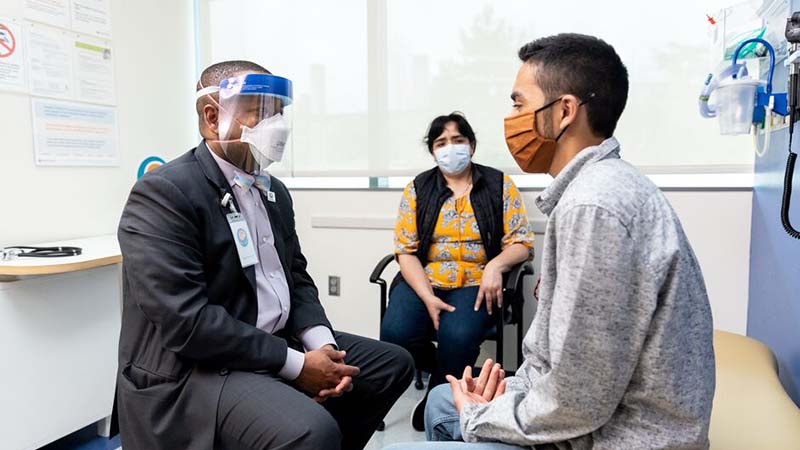GATHER MOC Project Curriculum Resources
Learning Objectives
Using self-assessment and discussions with peers:
- Apply concepts and definitions from EDI training to daily work;
- Recognize barriers to, and develop strategies for, increasing health equity for patients at your institution;
- Develop an individual SMART aim for improving health equity.
Documents and Resources
Before Session #1:
- Read Association Between Parent Comfort With English and Adverse Events Among Hospitalized Children (JAMA Pediatrics)
- Read Use of Race in Pediatric Clinical Practice Guidelines A Systematic Review (JAMA Pediatrics)
- Watch "The Origin of Race in the USA" from PBS (10 minutes)
- Watch the first two minutes of "Seattle On The Line: Examining the History & Contemporary Impact of Redlining" from The Seattle Channel (2 minutes)
- Watch "Boarding School Healing" from Native American Rights Fund (6 minutes)
- Set an intention: How will you further health equity in your daily work (e.g., clinical care, teaching, mentoring, research, QI, and/or administration, etc.)?
Between Sessions #1 and #2:
- Watch Kimberlé Crenshaw: The urgency of intersectionality (TED Talks)
- Read Communication Skills for Bridging Inequity (VITAL Talk)
- Write a SMART Aim based on the intention you set before or during meeting #1 – Smart, Measurable, Actionable, Relevant, Time-bound.
Between Sessions #2 and #3:
- Read Recognizing and Reacting to Microaggressions in Medicine and Surgery (JAMA Network)
- Read INCLUDE Curriculum: Recognizing and Responding to Microaggressions: Communication Frameworks (University of Washington/Seattle Children's Pediatrics Residency)
- Read From Diversity and Inclusion to Antiracism in Medical Training Institutions (nih.gov)
Additional Learning Opportunities
The American Academy of Pediatrics has compiled a series of educational videos based on the "Pediatrics for the 21st Century (Peds 21)" program at the 2020 AAP National Conference. "Fighting Racism to Advance Child Health Equity" explores what these concepts mean for pediatricians in our practices, institutions, and communities, and how we can promote health equity by applying an anti-racist lens to the systems shaping health and medicine. MOC Part 2 credit will be awarded after completion of the activity and a review of the required opportunity for self-reflection.
The American Board of Pediatrics is also offering a free course to members as a way for board-certified pediatricians to claim MOC Part 2 credit for diversity, equity, and inclusion-related (DEI) learning. Through the application in your ABP Portfolio, you will be asked to share the DEI-educational topic and type of learning activity (e.g., lecture, workshop, podcast) and answer two questions about lessons learned and application to practice. After reviewing your responses, they will then award MOC Part 2 credit to your ABP Portfolio based on the number of hours you claim.
Additional Resources
- White Privilege: Unpacking the Invisible Knapsack
- Trabian Shorters: A Cognitive Skill to Magnify Humanity
- Them and Me — The Care and Treatment of Black Boys in America
- Forty Years since “Taking Care of the Hateful Patient”
- The Impact of Racism on Child and Adolescent Health
- Anti-Racism and Race Literacy: A Primer and Toolkit for Medical Educators
- How Medical Education is Missing the Bull’s-eye
- Changing How Race Is Portrayed in Medical Education: Recommendations From Medical Students
- Hidden in Plain Sight — Reconsidering the Use of Race Correction in Clinical Algorithms
- Caring for American Indian and Alaska Native Children and Adolescents
- 5 Things Health Systems are Doing to Address Social Determinants of Health
- Association of Race/Ethnicity and Sex With Differences in Health Care Use and Treatment for Acne
- Our Opioid Crisis Reveals Deep Racial Bias In Addiction Treatment
- Racial/Ethnic Bias in Pediatric Care and the Criminalization of Poverty and Race/Ethnicity—Seek and Ye Shall Find
- Recognizing and Reacting to Microaggressions in Medicine and Surgery
- Identifying Modifiable Health Care Barriers to Improve Health Equity for Hospitalized Children
- Reflections: The Category of Us
- Inequity in Crisis Standards of Care
- Stressful Beginnings with Long-Term Consequences
- Immunizing Against Hate: Overcoming Asian American and Pacific Islander Racism
- Health Equity, Diversity & Inclusion Measures for Hospitals and Health System Dashboards
- Health Equity Challenges and CMS Resources to Help Address Them
- Use of Race in Pediatric Clinical Practice Guidelines A Systematic Review

